

CLASS ACTIONS. EU’s Collective Redress Directive. CITRIX. NOYB. ZOOM. France - FACEBOOK. TIKTOK U.K. INTERNET SOCIETY. UBER DATA BREACH. PRIVACY INTERNATIONAL. BA. eBASTILLE. GILATI V MGN. EASYJET CLASS ACTION. GOOGLE V VIDAL. GRINDR - Twitter - Adtech. Google UK Class action. MORRISSON - Copy. UBER DATA BREACH. Group litigation for personal data breaches – where are we now? In addition to the power of the Information Commissioner’s Office (ICO) to issue higher monetary penalties under GDPR, the recent wave of data protection group litigation claims in the UK courts highlights the additional liabilities that businesses may suffer to individual data subjects.

Rise of data protection group litigation claims The UK courts have recently seen several high-profile group litigation cases for breach of data protection legislation. Such claims were made either on an opt-in basis pursuant to a Group Litigation Order, where individual claimants have to take positive steps to join the action, or on an opt-out basis, known as representative actions, where individuals are not required to be named or joined at the inception of the proceedings.
Following the Group Litigation Order for the Morrisons case, the High Court granted another Group Litigation Order for claims brought against British Airways in relation to its high profile data breach in 2018. 1. Data collective actions the costs of losing control. Hiteshew Marriott Complaint REDACTED. GDPR, class actions and the right to compensation. The Court of Appeal recently overturned a High Court ruling and found that a claimant could serve an out of jurisdiction application against Google as part of a class action.

Ibrahim Hasan examines the judgment. In November 2018 we reported the decision of the English High Court in the case of Lloyd v Google [2018] EWHC 2599 (QB). In summary, Mr Lloyd, who is a consumer protection champion, was attempting to bring a ‘class action’ (or ‘representative’ action) against Google. He brought the claim on behalf of over four million Apple iPhone users, alleging that Google had secretly tracked some of their internet activity, for commercial purposes, between August 2011 and February 2012. Because Google is based in Delaware in the USA, Mr Lloyd first had to seek permission from the High Court to serve the legal action outside the jurisdiction of the English courts. Denham acts to allay fears over GDPR D-Day apocalypse - DecisionMarketing. Information Commissioner Elizabeth Denham has lambasted companies using scare tactics to flog “off the shelf” GDPR solutions, insisting that although there will be no grace period under the new regulation, companies which can prove they are moving towards compliance will not face tough sanctions.
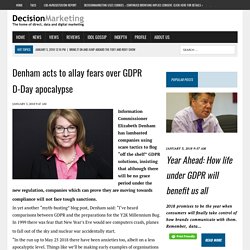
In yet another “myth-busting” blog post, Denham said: “I‘ve heard comparisons between GDPR and the preparations for the Y2K Millennium Bug. In 1999 there was fear that New Year’s Eve would see computers crash, planes to fall out of the sky and nuclear war accidentally start. “In the run up to May 25 2018 there have been anxieties too, albeit on a less apocalyptic level. The Take Back Your Privacy Foundation goes to court, demands more than 2 billion EUR from TikTok. – Stichting Take Back Your Privacy.
The Take Back Your Privacy Foundation (TBYP), in cooperation with the Consumentenbond, is taking TikTok to court.
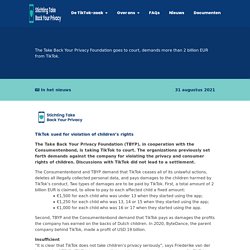
The organizations previously set forth demands against the company for violating the privacy and consumer rights of children. Discussions with TikTok did not lead to a settlement. The Consumentenbond and TBYP demand that TikTok ceases all of its unlawful actions, deletes all illegally collected personal data, and pays damages to the children harmed by TikTok’s conduct. Two types of damages are to be paid by TikTok. Europe’s GDPR offers privacy groups new ways to challenge adtech - Whose business is your data? Yahoo is now a part of Verizon Media. Yahoo is part of Verizon Media.

By clicking "Accept all" you agree that Verizon Media and our partners will store and/or access information on your device through the use of cookies and similar technologies and process your personal data, to display personalised ads and content, for ad and content measurement, audience insights and product development.
Your personal data that may be used Information about your account, device and internet connection, including your IP address Browsing and search activity while using Verizon Media websites and apps Precise location To enable Verizon Media and our partners to process your personal data select 'I agree', or select 'Manage settings' for more information and to manage your choices. You can change your choices at any time by visiting Your privacy controls. Group litigation for personal data breaches – where are we now? Data collective actions the costs of losing control. PART 19 - PARTIES AND GROUP LITIGATION - Civil Procedure Rules.
Contents of this Part Parties – general 19.1 Any number of claimants or defendants may be joined as parties to a claim.
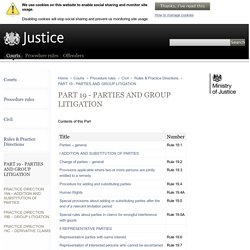
Back to top Change of parties – general (1) This rule applies where a party is to be added or substituted except where the case falls within rule 19.5 (special provisions about changing parties after the end of a relevant limitation period(GL)). I asked an online tracking company for all of my data and here's what I found. In fact, Quantcast’s deceptive design is so effective, that the company proudly declares that it achieves a 90 percent consent rate on websites that use its framework.
Data brokers and the hidden data ecosystem The fact that countless companies are tracking millions of people around the web and on their phones is disturbing enough, but what is even more disturbing about my Quantcast data is the extent to which the company relies on data brokers, credit referencing agencies, and even credit card companies in ways that are impossible for the average consumer to know about or escape. Advertising companies and data brokers have been quietly collecting, analysing, trading, and selling data on people for decades. What has changed is the granularity and invasiveness at which this is possible. Www.theverge. First GDPR Lawsuit: $8.2 billion Fines Claimed from Facebook and Google - Compliance Junction. [Euractiv] Facebook et Google visés par les premières plaintes pour non-respect du RGPD.
GDPR complaints against Google’s deceptive practices to track user location. European consumer organisations say Google breaching privacy rules. A number of European consumer organisations say Google’s way of tracking user location is in breach of GDPR privacy rules.
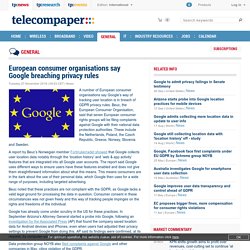
Beuc, the European Consumer Organisation, said that seven European consumer rights groups will be filing complaints against Google with their national data protection authorities. These include the Netherlands, Poland, the Czech Republic, Greece, Norway, Slovenia and Sweden. A report by Beuc’s Norwegian member Forbrukerradet showed that Google collects user location data notably through the ‘location history’ and ’web & app activity’ features that are integrated into all Google user accounts. The report said Google uses different ways to ensure users have these features enabled and does not give them straightforward information about what this means.
This means consumers are in the dark about the use of their personal data, which Google then uses for a wide range of purposes, including targeted advertising. Europe’s GDPR offers privacy groups new ways to challenge adtech - Whose business is your data? Privacy Groups Claim Online Ads Can Target Abuse Victims. 'Cookie Placement': 3rd Circuit Leaves Cy Pres-Only Settlement on the Menu, but With Reservations.
GDPR and representation of data subjects (Art 80) - Austrian Supreme Court Decision. Google hit with new biometric data privacy class action similar to one previously dismissed. On the heels of a proposed $550 million settlement that Facebook recently agreed to settle lawsuits under the controversial Illinois Biometric Information Privacy Act (BIPA), a deal which is still subject to the approval of U.S.
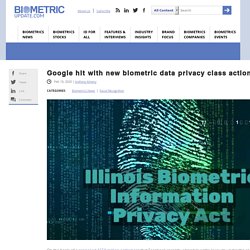
District Judge James Donato of the United States District Court Northern District Of California, Google was being served with a class-action lawsuit alleging it, too, has violated BIPA. “The amount in controversy exceeds $5 million exclusive of interest and costs … for damages and other legal and equitable remedies resulting from the illegal actions of Google in collecting, storing, and using the Plaintiff’s and other similarly-situated individuals’ biometric identifiers and biometric information without informed written consent, in direct violation of BIPA,” the class action suit alleges.
Internet Lawyer: DBLG: There are simply far too many cases (without writing a case book) to do this summary justice.
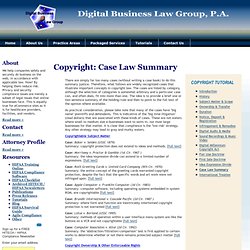
Therefore, what follows are widely recognized cases that illustrate important concepts in copyright law. The cases are listed by category, although the selection of categories is somewhat arbitrary and a particular case can, and often does, fit into more than one. The idea is to provide a brief one or two sentence summary of the holding/rule and then to point to the full text of the opinion where available. As practical consideration, please take note that many of the cases have "big name" plaintiffs and defendants. Garret Wilson > Education > Institutions > USF > Law > Intellectual Property > Cases. How a Supreme Court ruling may stop you from reselling just about anything. On Monday, the US Supreme Court will hear arguments in a case that pits a major textbook publisher against Supap Kirtsaeng, a student-entrepreneur who built a small business importing and selling textbooks.
“This case is an attempt by some brands and manufacturers to manipulate copyright law.” Like many Supreme Court cases, though, there's more than meets the eye. H2O Classroom Tools. Defendant Seeks to Limit CCPA’s Private Right of Action and Force Massive Class Action into Binding Arbitration. CPW has previously covered how companies are increasingly turning to consumer arbitration agreements to limit litigation exposure. While an arbitration agreement does not allow a defendant to avoid a lawsuit outright, it does provide an escape mechanism from the public scrutiny and cost of litigation. Issues concerning application of arbitration agreements continue to come up in privacy class actions, with litigations brought under the California Consumer Privacy Act (“CCPA”) presenting unique considerations. A recent CCPA class action may answer some open questions—read on below. Shadi Hayden v. Retail Equation et al., No. 20-cv-01203 (C.D. Spanish consumer group to sue Facebook over data sharing.